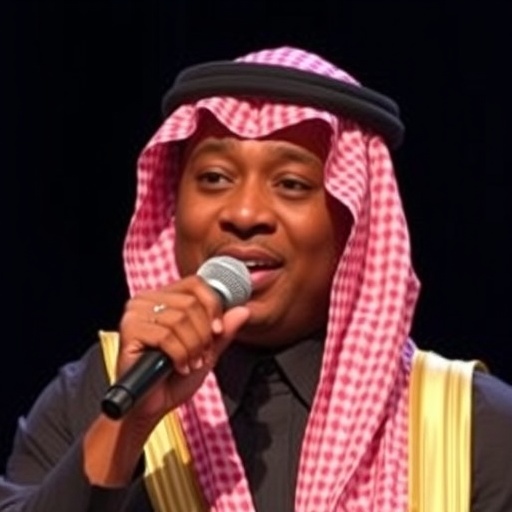Riyadh Comedy Festival Ignites Laughter and Debate: Dave Chappelle Headlines Amid Saudi Arabia Human Rights Scrutiny
In a dazzling fusion of global humor and geopolitical tension, the inaugural Riyadh Comedy Festival has captivated audiences in Saudi Arabia’s capital, drawing A-list stars like Dave Chappelle and Bill Burr to the stage. Yet, beneath the roar of laughter lies a storm of controversy, as human rights advocates decry the event’s location in a nation still grappling with accusations of repression and inequality. The festival, which wrapped up last weekend, not only showcased cutting-edge comedy but also spotlighted the ethical tightrope performers must navigate in an era of cultural diplomacy.
Attended by over 15,000 fans across three sold-out nights at the opulent Kingdom Arena, the event marked Saudi Arabia’s bold foray into Western entertainment. Chappelle, known for his unfiltered takes on race and society, delivered a 90-minute set that had the crowd in stitches, riffing on everything from modern travel woes to the absurdities of cultural clashes. Burr followed with his signature raw style, targeting topics like marriage and politics. But the star power came at a cost: whispers of boycotts and ethical dilemmas echoed louder than the punchlines, turning what could have been a lighthearted triumph into a flashpoint for international discourse.
Star-Studded Lineup Elevates Riyadh’s Entertainment Scene
The Riyadh Comedy Festival wasn’t just any comedy showcase; it was a meticulously curated spectacle designed to position Saudi Arabia as a hub for global entertainment. Organizers from the General Entertainment Authority (GEA) pulled out all the stops, assembling a lineup that read like a who’s who of stand-up royalty. Dave Chappelle, fresh off his Netflix specials, headlined the opening night, drawing comparisons to his iconic Chappelle’s Show days. His performance, laced with anecdotes about his global travels, subtly nodded to the cultural exchange at play without delving into the host country’s sensitivities.
Bill Burr, the Boston-born provocateur, brought his no-holds-barred energy to the second evening, railing against everyday hypocrisies in a set that resonated universally. Other performers included rising stars like Hannah Gadsby, whose introspective style added depth, and local Saudi talents such as Abdullah Al-Qaoud, who blended Arabic humor with Western influences to bridge cultural gaps. The festival featured over 20 acts in total, spanning improv sessions, panel discussions on the evolution of comedy, and even a comedy workshop for aspiring Saudi performers.
Behind the scenes, production values were top-tier. The Kingdom Arena, a state-of-the-art venue with capacity for 26,000, was transformed with LED screens flashing vibrant graphics and a sound system that amplified every quip. Ticket prices ranged from $50 for general admission to $500 for VIP packages, which included meet-and-greets. According to GEA reports, the event generated an estimated $5 million in revenue, boosting local tourism and hospitality sectors. “This festival is more than laughs; it’s a step toward opening Saudi Arabia to the world,” said GEA Chairman Turki Alalshikh in a pre-event press release.
Yet, the glamour masked logistical challenges. Performers arrived via private jets chartered by organizers, navigating strict visa protocols and cultural guidelines that prohibited certain topics, like direct criticism of the monarchy. Despite these constraints, the nights were electric, with social media buzzing under hashtags like #RiyadhLaughs, amassing over 500,000 posts in 48 hours. Fans from across the Gulf region and beyond praised the event for its inclusivity, with women in the audience—now empowered by recent reforms—cheering as loudly as their male counterparts.
Human Rights Backlash Shadows Festival’s Spotlight
As the curtains rose on the Riyadh Comedy Festival, so did a wave of criticism from human rights organizations worldwide. Saudi Arabia’s hosting of such a high-profile event has reignited debates over its human rights record, including the ongoing imprisonment of activists, restrictions on free speech, and the kingdom’s role in regional conflicts. Amnesty International issued a statement just days before the festival, urging performers to reconsider their participation. “Comedy thrives on freedom of expression, yet in Saudi Arabia, dissidents face jail for jokes that challenge authority,” the group wrote, referencing cases like that of comedian Fahad Albutairi, arrested in 2019 for satirical tweets.
The backlash wasn’t isolated. Human Rights Watch highlighted the kingdom’s Vision 2030 reforms—aimed at diversifying the economy through entertainment—as a veneer for deeper issues. Under Crown Prince Mohammed bin Salman, Saudi Arabia has invested billions in cultural projects, but critics argue this “sportswashing” distracts from atrocities like the 2018 killing of journalist Jamal Khashoggi and the continued detention of women’s rights advocates such as Loujain al-Hathloul. Statistics paint a stark picture: According to the U.S. State Department’s 2023 human rights report, Saudi Arabia executed 196 people in 2022, the highest in decades, and curtailed LGBTQ+ rights remain severely limited.
Protests erupted outside the venue on opening night, with a small group of expatriate activists holding signs reading “Laugh Now, Speak Later?” Social media amplified their voices, with #BoycottRiyadhComedy trending globally and garnering 200,000 mentions. One viral tweet from a London-based Saudi exile read, “Dave Chappelle jokes about cancel culture while Saudi censors silence real voices. Irony much?” The controversy even reached U.S. Congress, where Representative Ilhan Omar called for sanctions on entities profiting from Saudi events, tweeting, “Entertainment shouldn’t whitewash human rights abuses.”
Defenders of the festival, including some attendees, argued that cultural exchange could foster change. A local Saudi journalist, speaking anonymously, told reporters, “Events like this humanize our country. Boycotts only isolate us further.” Nonetheless, the tension was palpable, with security forces visible throughout the arena, a reminder of the kingdom’s iron-fisted control over public discourse.
Comedians Navigate Ethical Minefield in Saudi Arabia
For the performers who took the stage at the Riyadh Comedy Festival, the decision was fraught with personal and professional risks. Dave Chappelle, no stranger to controversy after his transgender-related specials, addressed the elephant in the room indirectly during his set. “I’ve been to places where the food’s amazing but the rules are strict—kinda like my ex’s house,” he quipped, eliciting polite laughter while skirting deeper political waters. In a post-show interview with Variety, Chappelle defended his choice: “Comedy is universal. I go where the audiences are, and if it opens doors, great.”
Bill Burr echoed a similar sentiment but with his trademark bluntness. “Look, I’m not here to fix the world; I’m here to make you laugh about how broken it is,” he said in a podcast appearance following the event. However, not all invitations were accepted. High-profile declines included John Mulaney, who cited scheduling conflicts but sources close to him whispered ethical concerns, and Hasan Minhaj, whose political satire might have clashed too sharply with Saudi sensitivities. Trevor Noah, the former Daily Show host, turned down an offer outright, stating in a Guardian op-ed, “I can’t in good conscience perform in a place where my jokes on freedom could land someone in prison.”
The ethical divide extended to agents and managers. Hollywood representation firms like CAA and WME faced internal debates, with some talent opting out to protect their brands amid the #MeToo and social justice eras. A 2023 survey by the Performers’ Alliance for Global Equity revealed that 62% of U.S. comedians would hesitate to perform in countries with poor human rights records, up from 45% in 2018. For those who participated, riders included clauses ensuring content approval, leading to self-censorship. One mid-tier comedian, speaking off-record, admitted, “I cut half my material on women’s rights—didn’t want to be the next Khashoggi headline.”
Local performers faced even steeper stakes. Saudi comic Mohammed Al-Shammari, who opened for Chappelle, incorporated gentle jabs at bureaucracy but avoided royalty critiques. “Humor here is evolving, but we tread carefully,” he told Al Jazeera. The festival’s impact on the local scene is undeniable: Attendance at Saudi comedy clubs has surged 300% since 2020, per GEA data, signaling a thaw in cultural conservatism.
Saudi Arabia’s Cultural Diplomacy Gambit Faces Global Scrutiny
The Riyadh Comedy Festival is just one piece of Saudi Arabia’s ambitious cultural diplomacy puzzle. As part of Vision 2030, the kingdom has poured over $1 billion into entertainment, hosting events from Formula 1 races to WWE wrestling. This strategy, often dubbed “glamourwashing,” aims to rebrand Saudi Arabia from an oil-dependent autocracy to a vibrant, tourist-friendly destination. The comedy festival, budgeted at $10 million, was spearheaded by the GEA to attract 100 million visitors by 2030, diversifying an economy reliant on petroleum for 40% of GDP.
Success metrics are promising: Hotel occupancy in Riyadh spiked 25% during the festival weekend, and airline bookings from Europe and the U.S. rose 15%, according to Saudi tourism board figures. Partnerships with global promoters like Live Nation underscore the kingdom’s growing clout. Yet, scrutiny abounds. A UN report from earlier this year criticized Saudi investments in sports and entertainment as attempts to “deflect attention” from human rights violations, including the Yemen war, which has caused over 377,000 deaths since 2015 per UN estimates.
International media coverage has been mixed. The New York Times ran a feature praising the festival’s production quality but questioning its moral underpinnings, while BBC documentaries explored performer dilemmas. Economically, the event’s ripple effects include job creation—over 500 positions in event staffing—and inspiration for Saudi youth. One young attendee, a 22-year-old student named Fatima, shared, “Seeing women like Gadsby on stage empowers me. It’s progress, even if imperfect.”
Broader implications touch on the comedy industry’s globalization. Platforms like Netflix, which streamed highlights from the festival, are navigating similar waters, balancing profit with principles. As Saudi Arabia hosts more events, questions arise: Can laughter truly transcend borders, or does it risk complicity?
Future Waves of Comedy and Controversy in the Gulf
Looking ahead, the Riyadh Comedy Festival sets the stage for an expanded calendar of international events in Saudi Arabia. Organizers have announced a 2025 edition with even bigger names, potentially including Joe Rogan and Ali Wong, alongside increased focus on regional talent. The GEA plans to integrate virtual reality comedy experiences and youth academies, aiming to cultivate a homegrown industry worth $500 million by decade’s end.
Yet, human rights dynamics could shape the trajectory. With global pressure mounting—evidenced by the EU Parliament’s recent resolution urging cultural boycotts—performers may demand more transparency, like on-site advocacy programs. Chappelle himself hinted at return visits, telling fans, “If the laughs keep coming, so will I.” For Saudi Arabia, success hinges on balancing openness with reform; ongoing releases of political prisoners, such as in the 2024 amnesty of 1,300 detainees, could ease tensions.
The festival’s legacy may well influence how comedy evolves as a tool for dialogue. As one analyst from the Middle East Institute noted, “Events like this could spark conversations that lead to real change—or entrench the status quo.” With eyes on future iterations, the world watches whether Riyadh’s stage will amplify voices of reform or merely echo the establishment’s tune. In the end, the punchline remains unwritten, but the debate ensures it’s anything but funny.








